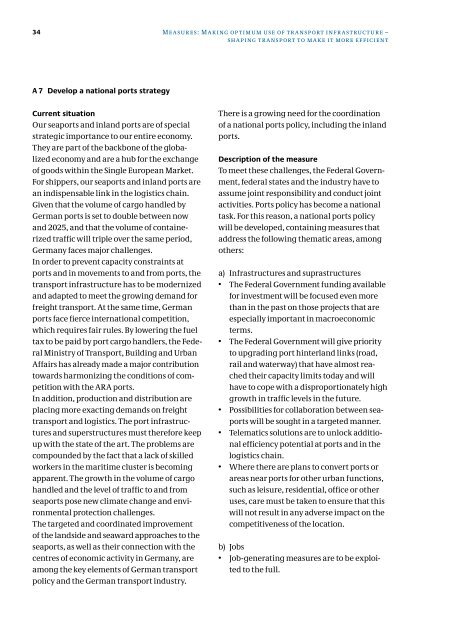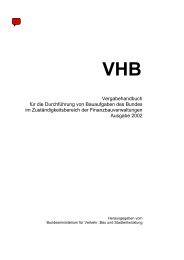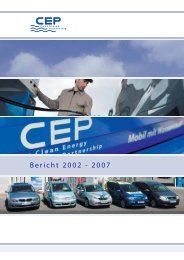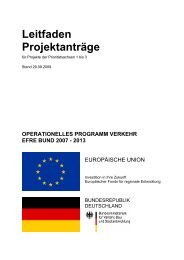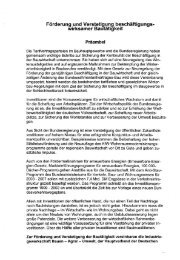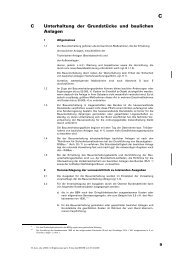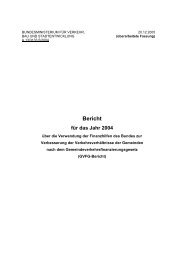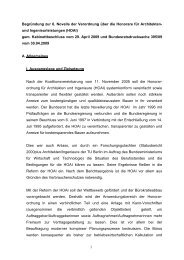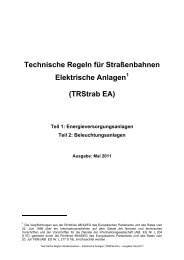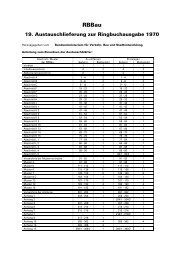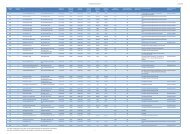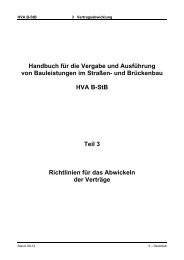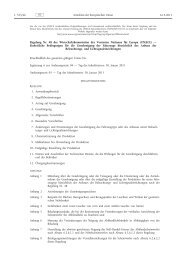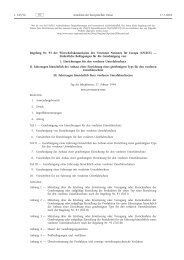Freight Transport and Logistics Masterplan - Bundesministerium für ...
Freight Transport and Logistics Masterplan - Bundesministerium für ...
Freight Transport and Logistics Masterplan - Bundesministerium für ...
You also want an ePaper? Increase the reach of your titles
YUMPU automatically turns print PDFs into web optimized ePapers that Google loves.
A Develop a national ports strategy<br />
Current situation<br />
Our seaports <strong>and</strong> inl<strong>and</strong> ports are of special<br />
strategic importance to our entire economy.<br />
They are part of the backbone of the globalized<br />
economy <strong>and</strong> are a hub for the exchange<br />
of goods within the Single European Market.<br />
For shippers, our seaports <strong>and</strong> inl<strong>and</strong> ports are<br />
an indispensable link in the logistics chain.<br />
Given that the volume of cargo h<strong>and</strong>led by<br />
German ports is set to double between now<br />
<strong>and</strong> 2025, <strong>and</strong> that the volume of containerized<br />
traffic will triple over the same period,<br />
Germany faces major challenges.<br />
In order to prevent capacity constraints at<br />
ports <strong>and</strong> in movements to <strong>and</strong> from ports, the<br />
transport infrastructure has to be modernized<br />
<strong>and</strong> adapted to meet the growing dem<strong>and</strong> for<br />
freight transport. At the same time, German<br />
ports face fierce international competition,<br />
which requires fair rules. By lowering the fuel<br />
tax to be paid by port cargo h<strong>and</strong>lers, the Federal<br />
Ministry of <strong>Transport</strong>, Building <strong>and</strong> Urban<br />
Affairs has already made a major contribution<br />
towards harmonizing the conditions of competition<br />
with the ARA ports.<br />
In addition, production <strong>and</strong> distribution are<br />
placing more exacting dem<strong>and</strong>s on freight<br />
transport <strong>and</strong> logistics. The port infrastructures<br />
<strong>and</strong> superstructures must therefore keep<br />
up with the state of the art. The problems are<br />
compounded by the fact that a lack of skilled<br />
workers in the maritime cluster is becoming<br />
apparent. The growth in the volume of cargo<br />
h<strong>and</strong>led <strong>and</strong> the level of traffic to <strong>and</strong> from<br />
seaports pose new climate change <strong>and</strong> environmental<br />
protection challenges.<br />
The targeted <strong>and</strong> coordinated improvement<br />
of the l<strong>and</strong>side <strong>and</strong> seaward approaches to the<br />
seaports, as well as their connection with the<br />
centres of economic activity in Germany, are<br />
among the key elements of German transport<br />
policy <strong>and</strong> the German transport industry.<br />
Measures: Making optimum use of tr ansport infr astructure – Measures: Making optimum use of tr ansport infr astructure –<br />
shaping tr ansport to make it more efficient<br />
shaping tr ansport to make it more efficient<br />
There is a growing need for the coordination<br />
of a national ports policy, including the inl<strong>and</strong><br />
ports.<br />
Description of the measure<br />
To meet these challenges, the Federal Government,<br />
federal states <strong>and</strong> the industry have to<br />
assume joint responsibility <strong>and</strong> conduct joint<br />
activities. Ports policy has become a national<br />
task. For this reason, a national ports policy<br />
will be developed, containing measures that<br />
address the following thematic areas, among<br />
others:<br />
a) Infrastructures <strong>and</strong> suprastructures<br />
• The Federal Government funding available<br />
for investment will be focused even more<br />
than in the past on those projects that are<br />
especially important in macroeconomic<br />
terms.<br />
• The Federal Government will give priority<br />
to upgrading port hinterl<strong>and</strong> links (road,<br />
rail <strong>and</strong> waterway) that have almost reached<br />
their capacity limits today <strong>and</strong> will<br />
have to cope with a disproportionately high<br />
growth in traffic levels in the future.<br />
• Possibilities for collaboration between seaports<br />
will be sought in a targeted manner.<br />
• Telematics solutions are to unlock additional<br />
efficiency potential at ports <strong>and</strong> in the<br />
logistics chain.<br />
• Where there are plans to convert ports or<br />
areas near ports for other urban functions,<br />
such as leisure, residential, office or other<br />
uses, care must be taken to ensure that this<br />
will not result in any adverse impact on the<br />
competitiveness of the location.<br />
b) Jobs<br />
• Job-generating measures are to be exploited<br />
to the full.<br />
• Targeted programmes for the integration of<br />
the unemployed are to be supported.<br />
• Efforts to create apprenticeships for young<br />
people should be stepped up.<br />
c) Environmental protection <strong>and</strong><br />
climate change<br />
• Emissions st<strong>and</strong>ards in the shipping sector<br />
(sulphur, nitrogen oxides, particulate<br />
matter) are to be evolved <strong>and</strong> maritime<br />
shipping is to be included in emissions<br />
trading in a manner that does not distort<br />
competition.<br />
• New propulsion technologies are to be<br />
developed <strong>and</strong> new materials used in shipbuilding.<br />
d) Competition<br />
• Further measures to reduce distortions of<br />
competition are to be reviewed <strong>and</strong> – as far<br />
as possible – implemented.<br />
• State aids result in distortions of competition.<br />
Germany is lobbying in Europe for more<br />
transparency in this sphere. The European<br />
Commission is urged to present uniform<br />
state aid guidelines.<br />
e) Combined transport<br />
• In order to cope with the forecast volumes<br />
of cargo, short sea shipping <strong>and</strong> inl<strong>and</strong> navigation<br />
will also have to be strengthened.<br />
Here, the inl<strong>and</strong> ports will play an increasingly<br />
important role, offering services ranging<br />
from a supra-regional hub to a regional<br />
distribution centre for the seaports.<br />
Impact<br />
This measure is designed to strengthen the<br />
ports as major import/export hubs <strong>and</strong> as logistics<br />
<strong>and</strong> processing centres.<br />
Responsibility<br />
The Federal Ministry of <strong>Transport</strong>, Building<br />
<strong>and</strong> Urban Affairs, the federal states <strong>and</strong> the<br />
ports industry are responsible for this<br />
measure.<br />
Budgetary relevance<br />
It will not be possible to quantify the impact<br />
on the budget until the ports strategy has been<br />
drawn up.<br />
EU relevance<br />
This measure is consistent with the European<br />
Commission’s ports policy.<br />
Implementation period<br />
The strategy will be presented in 2008.


